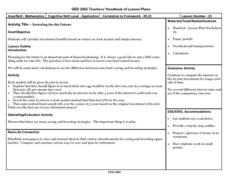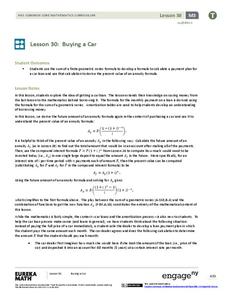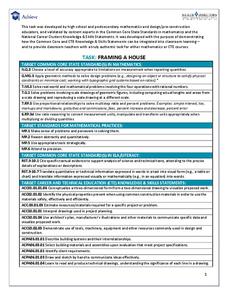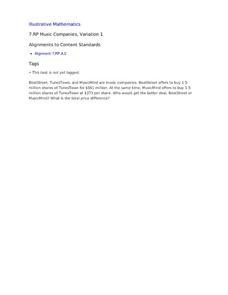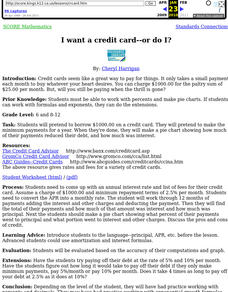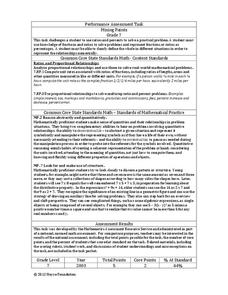Curated OER
Numeral Analysis: Rate of Convergence
In this rate of convergence learning exercise, students use three different methods to compute an order of convergence of a function. This four-page learning exercise contains approximately 10 problems, with examples.
Curated OER
ABC's Of Figuring Interest
High schoolers participate in a lesson of figuring interest. This is done in order to strengthen number calculation skills while computing the interest when buying different things. This done in conjunction with using credit to make...
Inside Mathematics
Swimming Pool
Swimming is more fun with quantities. The short assessment task encompasses finding the volume of a trapezoidal prism using an understanding of quantities. Individuals make a connection to the rate of which the pool is filled with a...
Curated OER
Compound Interest and Quiz on Logs
Students discuss how money accumulates interest. In this calculus activity, students discuss compund interest based on years of investing the money. They discuss rate per period, principal and number of periods.
Curated OER
The Bank Account
Your algebra learners become bankers for a day as they explore compounding interest and the formula used to calculate the balance in a savings account. Questions guide the learners as they analyze the formula's parts and their connection...
Curated OER
Home Sales Records
Teach your class how to calculate monthly payments on a home mortgage. In this percent lesson, young scholars calculate the monthly payment on a home mortgage, and compare different lengths of time and the interest rates for national...
Curated OER
Numerical Analysis/ Orders of Convergence of a Sequence
In this math instructional activity, students examine the concept of orders of convergence for a sequence. They practice finding the different rates of convergence.
Curated OER
Chapter 12 - Objective 5.1 Formula Problems
In this formula worksheet, students read short story problems and determine the correct formula. They compute compound interest, use the Richter equation to figure magnitude and find the pH of given solutions. This one-page worksheet...
Curated OER
Investing for the Future
Twelfth graders perform basic calculations for saving and investment strategies. they simulate the investment of $1,000 in the stock market and savings account. they determine which pays the greater dividend.
Curated OER
Recipe: Unit Rate
Young scholars solve problems using ratios and proportions. In this algebra activity, students identify the unit rate and convert between fractions and decimals. They create graphs from their data.
Curated OER
In Debt or Not In Debt
Students investigate the use of credit cards. In this algebra lesson, students differentiate the interest rate of credit cards and how to stay debt free. They identify pros and cons of credit cards.
Curated OER
PAY CREDIT WHEN CREDIT IS DUE
Students learn about credit cards and scores and how to and not to use them. In this financial concept lesson, students are given hypothetical scenarios where they are able to apply learning's to given situations as they figure rates,...
Curated OER
Credit Purchases
Twelfth graders calculate interest on purchases bought with a credit card. They use the formula I=PRT to find the interest. In pairs, they use a flyer to calculate the interest for electronic items.
Curated OER
Number and Operation: All About Monday - Does it Pay?
Solve real-world financial math problems. High schoolers will work through a series of problems as they look at credit card interest, bill payment, and other real-world personal money matters.
California Education Partners
Linflower Seeds
How does your garden grow? Use proportions to help Tim answer that question. By using their understanding of proportional relationships, pupils determine the number of seeds that will sprout. They create their own linear relationships...
Curated OER
Which Is the Better Car Deal?
Pupils investigate whether it is more economically sound to take a low financing rate or rebate when purchasing a car.
Curated OER
Buying My First Car
Learners pretend they are about to buy their first new car. They must do all the calculations necessary to estimate the cost of purchasing the car. They see that the math they learn in school really does have real-life applications.
EngageNY
Buying a Car
Future car owners use geometric sums to calculate payments for a car loan in the 31st installment of a 35-part module. These same concepts provide the basis for calculating annuity payments.
Los Angeles County Office of Education
Assessment For The California Mathematics Standards Grade 6
Test your scholars' knowledge of a multitude of concepts with an assessment aligned to the California math standards. Using the exam, class members show what they know about the four operations, positive and negative numbers, statistics...
Achieve
Framing a House
If members of your class wonder where they can use the math they learn in middle school, let them discover the answer. Learners apply geometry concepts of scale and measure to calculate the costs of framing a house addition.
Curated OER
7.RP Music Companies, Variation 1
We've got the beat! And your musically-minded mathematicians will tap their toes as they determine which music company would be getting a better deal based on their offers to buy out TunesTown. The topic is extended in an additional task...
Curated OER
I want a credit card--or do I?
Students pretend to borrow $1000.00 on a credit card. They pretend to make the minimum payments for a year. When they're done, they make a pie chart showing how much of their payments reduced their debt, and how much was interest.
Curated OER
Growth and Decay
In this math worksheet, learners compute the annual rate of appreciation or depreciation in a set of 7 problems. Each problem involves a given amount of money (or value) and indicates the percent of appreciation or depreciation.
Noyce Foundation
Mixing Paints
Let's paint the town equal parts yellow and violet, or simply brown. Pupils calculate the amount of blue and red paint needed to make six quarts of brown paint. Individuals then explain how they determined the percentage of the brown...










